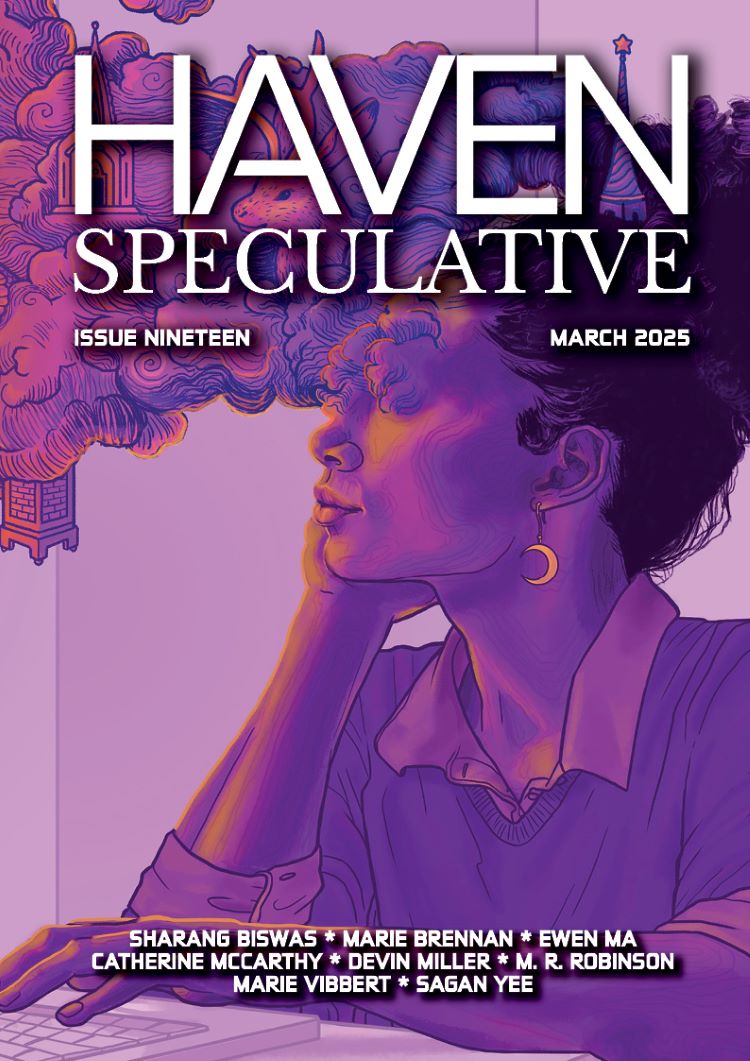FICTION
Handsomest Gentlest
By M. R. Robinson in Issue Nineteen, March 2025
Everybody said Black Shuck was a great big fearsome devil, but I wasn't so scared the night I met him in the woods. I'd only been dead for two hours, and I was too busy feeling sorry for myself to be afraid of some old black dog curled up crying in the bushes.
The sound of his whimpering cut right through my own tears. I wiped my drippy nose as best I could, sniffled once or twice more for good measure, and followed the noise until I saw the shape of him. His whimpering was how I knew he was a dog and not a monster. His burning red eyes when he looked up were how I knew he was Black Shuck. A demon's eyes, Bloody Roger Barnaby told me later, hot as hellfire: proof that Shuck had crawled up from below to haunt these woods. I don't know about that—sometimes I think Roger Barnaby doesn't know anything about anything—but he looked like he'd crawled out of the stories, at least.
A True Account of a Pre-Teen Blob
By Marie Vibbert in Issue Nineteen, March 2025
Milly and I walked home from school to find Mom sitting on the porch with her suitcase on her lap. She turned away from us and shouted into the door, "They're here. Move it!"
Our older sister, Becky, slouched out in barely obedient teen anger, a beach tote on one shoulder and a plastic grocery bag in her other hand.
"Leave your schoolbooks," Mom said, standing. "Let's go."
Coming Home to Leviathan
By Sagan Yee in Issue Nineteen, March 2025
Ewing taught her how to do it safely, with a red foil wrapper from one of those strawberry candies they gave out with your bill at every Chinese restaurant. "They're for good luck," he'd said, the first time they tried it. That, and something to do with electrical conductivity. That way you got unlimited minutes and the full spectrum of sensation, undiluted by the cranial filters they put in to stop people from spiraling out. Or, as Ewing put it, to stop people like them from having fun.
They'd been having a lot of fun, lately.
Host
By Catherine McCarthy in Issue Nineteen, March 2025
It is the stream that leads Gethin to the cove. At night it burbles in his dreams, foaming at the mouth and demanding he follow it. And so he obliges.
Seven miles he walks, with the stream as his guide. Seven miles in pitch dark, through field and forest, until he arrives at the coast at the cusp of dawn. Poised on the clifftop, Gethin peers down on a mercury-tinted bay while the stream cascades over the cliff, spewing its guts into the sea.
The Ways the Woods May Answer
By Jennifer Mace in Issue Eighteen, November 2024
They would not bury her in consecrated ground. Her life was all the wrong forms of holy.
She walked barefoot through Beltane fields and knew all the herbs of the deep woods; her hands were the first touch infants knew in life, and those who had only the cold press on the eyelids of corpses, the swipe of water over supplicant brows, were jealous of that bloody strength.
No matter. Your beloved did not belong below stone or ringed by paltry yew.
The Rooms Behind the Kitchen
By Christi Nogle in Issue Eighteen, November 2024
It began at least six months before her end, though of course Rose-Ellen didn't know to frame it in such terms at that time. A little nudge out of her body and to the side, subtle at the start as such dire things often are. She searched for her symptoms and received imperfect terms Depersonalization, she googled, derealization. Her sensations both were and weren't as described. She was pretty sure it was something else, sharing some features with these known phenomena but ultimately something more.
She cleared her browser history, imagining someone taking those searches as clues to something, in the future. As though anyone would try to unravel the mystery of her life after the fact.
Desperate Ark Wives
By Somto Ihezue in Issue Eighteen, November 2024
The Book of Genesis
Chapter 7: And They Were Witches.
1Two by two... of the clean animals and the unclean, of the birds, and of everything that crawls, male and female, they all came to Noah, into the ark, just as God had commanded. 2Then the rains poured down. And the fountains of the great deep burst forth, and floodgates of the skies were flung open.
3Noah, a steadfast and faithful servant of God, manned the ark and oversaw the boarding of all creatures great and small. 4Noah and his sons: Shem, Ham, and Japheth, were the only men aboard the ark... but we know they were not the only people.
Music, Murder, Murmuration
By Courtney Floyd in Issue Eighteen, November 2024
Ever since her sisters kicked her out of the family band, Cyrene had been searching for someone she could harmonize with. The problem was her auditions had a nasty habit of turning into massacres. Figurative, sure. But also, inevitably,
There was the Americana group out in Asheville—they'd been promising until they'd fizzed out like Cheerwine shaken hard and fast before Cyrene even got to the chorus. And just like that bright red soda pop, their contents stained the carpets. And the walls. And Cyrene, when she tried to revive them.
A Eulogy for Patience
By Chloe Smith in Issue Eighteen, November 2024
"This can't be what you want," the oldest and most powerful suitor says. His mouth is stained red. He wipes it with the back of his hand, jerks his head towards the chaos that breaks across the room, the shouts and wild gestures, the spilled wine and half-eaten food.
"They will beggar you with this waste. Is this a proper legacy for your husband's riches?" His words are soft, but his grin curves like a scorpion's tail.
I refuse to look. I keep my spine stiff and tilt my chin down to stare into the leaping flames in the hearth.
The God Who Never Sleeps Dwells Under an Inky Sea
By A. W. Prihandita in Issue Seventeen, September 2024
Affan lay sprawled on the giant seawall like he was already dead. The waves crashed against his side and sprayed over him, every drop a stab of pain to the hundred cuts he'd got when the storm swallowed him. His fishing boat was nowhere to be seen.
Disoriented though he was, he didn't need to look around to know his location. This was Jakarta Bay, inky black and smelling of rot. Affan's hand came out slimy when he dipped it in the water, as if he'd reached into the gullet of a decomposing snake and slathered his skin with its bile and venom. This giant seawall had protected Jakarta from tidal waves, but it also trapped sewage in the bay, dooming the capital to sink in its own piss and trash. Who knew how much of the toxins had seeped into his body as he lay there with open wounds? It was probably too late to do anything about it.




